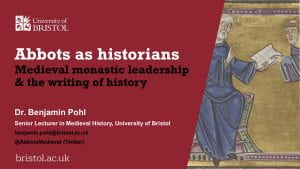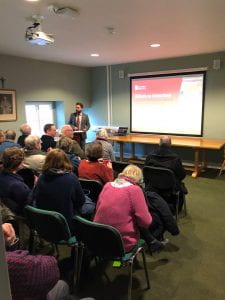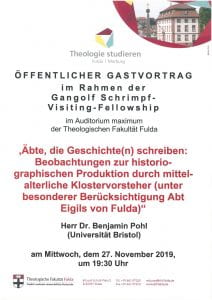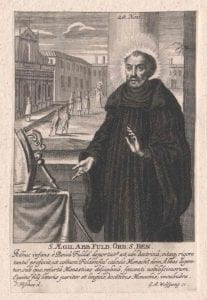In this public lecture, given at Downside Abbey on Thursday 27 February 2020, Dr Benjamin Pohl (University of Bristol, project PI) explores how and why medieval Benedictine abbots engaged first-hand with the writing of history by recording the traditions and collective memories of their monastic communities. Which resources were available to these abbot-historians that ordinary monks did not have at their disposal? What difference did it make when the monastic historian was himself an abbot? Was it common for medieval abbots to pick up the pen, or was it an exception? Studying the work of medieval abbot-historians provides us with important insights into the relationship between monastic leadership and the codification of communal identities both past and present. You can listen to the podcast and see some pictures from the night below.
Category: Podcast
Podcast: Äbte, die Geschichte(n) schreiben/Abbots writing history (public lecture by Dr B Pohl)
Podcast „Äbte, die Geschichte(n) schreiben: Beobachtungen zur historiographischen Produktion durch mittelalterliche Klostervorsteher (unter besonderer Berücksichtigung Abt Eigils von Fulda)“
(öffentlicher Gastvortrag, gehalten am 27.11.2019; Vortragssprache: deutsch; Zusammenfassung s. u.).
Podcast “Abbots writing history: Some considerations concerning the role(s) of abbots in medieval historiographical production (with a particular emphasis on Abbot Eigil of Fulda)”
(public lecture, delivered 27/11/2019; language: German; synopsis below).
Image credit (right): Portrait of Abbot Eigil of Fulda (818–22) by Georg Andreas Wolfgang (1631–1716), Austrian National Library (ÖNB) © Public Domain – Europeana collections (http://europeana.eu/).
Zusammenfassung: Dr. Benjamin Pohl (Projekt-PI) ist ein in Bamberg promovierter und an der Universität Bristol (Großbritannien) als Senior Lecturer tätiger Mittelalterhistoriker und Handschriftenforscher. Im November 2019 war er als Gangolf-Schrimpf Visiting Fellow am Institut Bibliotheca Fuldensis and der Theologischen Fakultät Fulda zu Gast. Im Rahmen dieses öffentlichen Gastvortrages (gehalten am 27.11.2019) geht Dr. Pohl der Frage nach, in welchem Rahmen und zu welchem Zweck mittelalterliche Benediktineräbte selbst zur Feder griffen, um die Geschichte ihres Klosters und das kollektive Gedächtnis der Mönchsgemeinschaft zu Pergament zu bringen. Welche Ressourcen und Handlungsspielräume standen diesen Äbten bei der Geschichtsschreibung von Amts wegen zur Verfügung, über die ein einfacher Mönch oder ein anderer Schreiber inner- wie außerhalb des Klosters eben nicht oder nur bedingt verfügte? Welchen Unterschied machte es, wenn der Geschichtsschreiber ein Abt war? Im Vortrag wird neben vergleichenden Beobachtungen vor allem Bezug zur speziellen Situation Fuldas im frühen neunten Jahrhundert genommen. Eine erweiterte Version des Vortrags wird als Kapitel in Dr. Pohls neuer Monografie, Medieval Abbots and the Writing of History (Oxford University Press) erscheinen. Außerdem bereitet Dr. Pohl einen themenverwandten Zeitschriftenaufsatz für das Archiv für mittelrheinische Kirchengeschichte vor.
Synopsis: Dr Benjamin Pohl (project PI) is a medieval European historian and manuscript scholar. Having received his PhD from the University of Bamberg (Germany), he is Senior Lecturer in Medieval History at the University of Bristol. In November 2019, he held the Gangolf-Schrimpf Visiting Fellowship the Research Institute Bibliotheca Fuldensis at the Faculty of Theology in Fulda. In this public lecture (delivered 27/11/2019), Dr Pohl explores to what degree and to what end(s) medieval Benedictine abbots engaged first-hand with the writing of history to codify the traditions and collective memories of their monastic communities. Which means and opportunities were available to these abbots when writing history that ordinary monks or other writers in- and outside the monastery did not have at their disposal? What difference did it make when the historian was himself an abbot? Following some general observations, the talk specifically addresses the particular situation at Fulda during the early ninth century. An extended version of this talk is going to be published as a chapter in Dr Pohl’s new monograph, Medieval Abbots and the Writing of History (Oxford University Press). Dr Pohl is also preparing a related journal article for the Archiv für mittelrheinische Kirchengeschichte.






